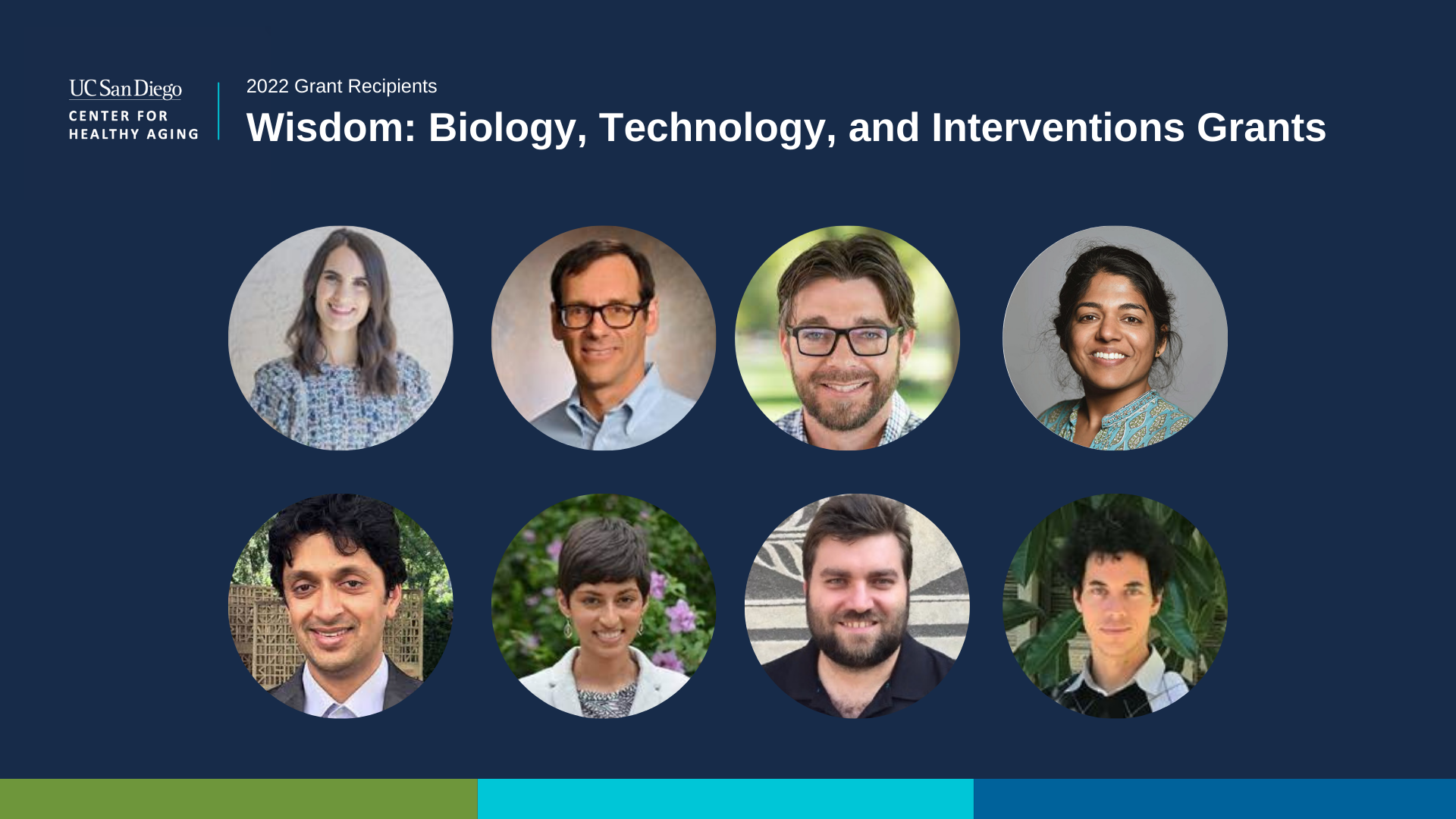2022 Wisdom: Biology, Technology, and Interventions Grants

UC San Diego's Stein Institute for Research on Aging and the Center for Healthy Aging are thrilled to announce the recipients of the 2022-23 pilot grant awards for collaborative research on Wisdom: Biology, Technology, and Interventions. Selected scientists will receive up to $50,000 (depending on the scope of the project) for one year to execute their proposed research aims. Learn more about the awarded projects below.
Study of Genetics of Wisdom with San Diego Wisdom Scale in Half a Million 23andMe Participants
Abraham Palmer, PhD, Professor of Psychiatry, UC San DiegoSandra Sanchez-Roige, PhD, Assistant Professor, Dept. of Psychiatry & Div. of Genetic Medicine, UC San Diego
This study plans to perform the first genome-wide association analysis (GWAS) ofwisdom ever conducted. Leveraging their long-standing collaboration with the genetics company 23andMe, the researchers will administer an online survey and collect responses on wisdom in half a million individuals with genotype data already available. Researchers will be able to study how age influences wisdom.
Malleability of Brain Systems that Mediate Wisdom and Reflective Thinking: A Functional Magnetic Resonance Imaging Study
Michael Thomas, PhD, Assistant Professor, Cognitive Neuroscience, Colorado State University
Are brain systems that mediate reflective thinking are affected by mindful meditation? If so, what are the specific targets for interventions improving wisdom and overall mental health? Researchers will recruit 40 older adults aged 18 to 80. Participants will undergo MRI scanning while completing a mindful meditation task as a well as a reflective thinking paradigm.
Repetitive transcranial magnetic stimulation (rTMS) is an FDA-approved treatment fordepression that involves application of brief magnetic pulses on the head surface over the dorsolateral prefrontal cortex, a critical brain region for executive control. In this study, researchers will probe changes in emotion regulation-based neural processes that have been found to be significantly associated with wisdom. 102 participants will undergo rTMS to help with the study.
To our knowledge, wisdom has never been directly assessed in a nonhuman species. However, strong evidence indicates that nonhuman primates (NHPs) possess many of the same age-varying social behaviors that underlie human wisdom – prosociality, positivity bias, boldness, and social influence. This project seeks to develop an assessment tool for measuring wisdom in NHPs
Are brain systems that mediate reflective thinking are affected by mindful meditation? If so, what are the specific targets for interventions improving wisdom and overall mental health? Researchers will recruit 40 older adults aged 18 to 80. Participants will undergo MRI scanning while completing a mindful meditation task as a well as a reflective thinking paradigm.
Assessing Behavioral and Neural Plasticity underlying Facets of Wisdom with Cognitive Neurostimulation for Depression
Jyoti Mishra, PhD, Assistant Professor, Department of Psychiatry, UC San DiegoDhakshin Ramanathan, MD, PhD, Assistant Professor In Residence, UC San DiegoResh Singh Gupta, PhD, Postdoctoral Fellow, Stein Institute for Research on Aging, UC San DiegoRepetitive transcranial magnetic stimulation (rTMS) is an FDA-approved treatment fordepression that involves application of brief magnetic pulses on the head surface over the dorsolateral prefrontal cortex, a critical brain region for executive control. In this study, researchers will probe changes in emotion regulation-based neural processes that have been found to be significantly associated with wisdom. 102 participants will undergo rTMS to help with the study.
The Hominoid Wisdom Scale: Developing a Novel Instrument for Assessing Wisdom in Nonhuman Primates
Jordan Kohn, PhD, Postdoctoral Scholar, Department of Psychiatry, UC San DiegoFederico Rossano, PhD, Assistant Professor, Department of Cognitive Neuroscience, UC San DiegoTo our knowledge, wisdom has never been directly assessed in a nonhuman species. However, strong evidence indicates that nonhuman primates (NHPs) possess many of the same age-varying social behaviors that underlie human wisdom – prosociality, positivity bias, boldness, and social influence. This project seeks to develop an assessment tool for measuring wisdom in NHPs